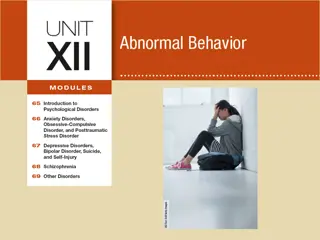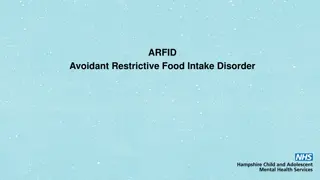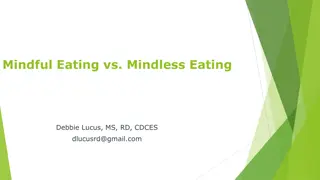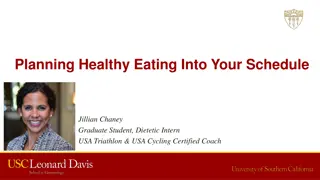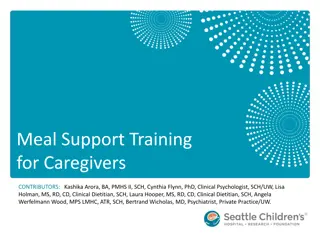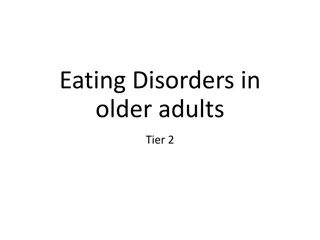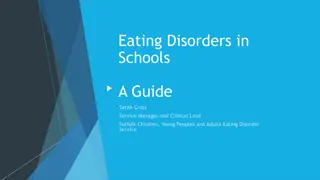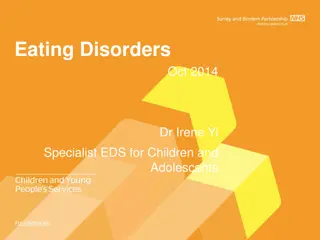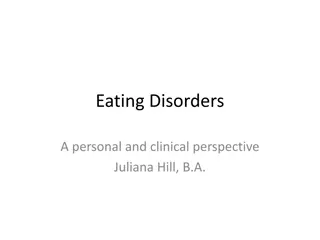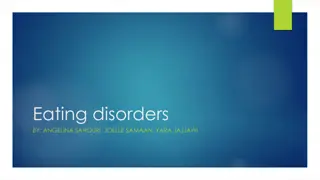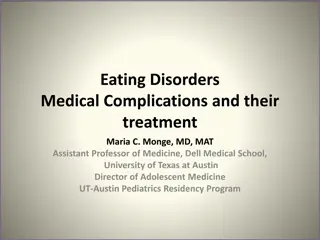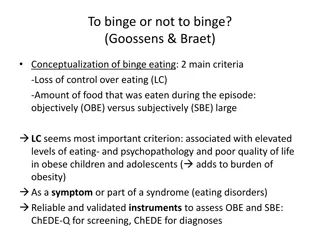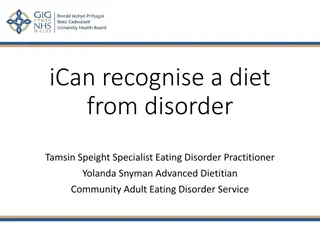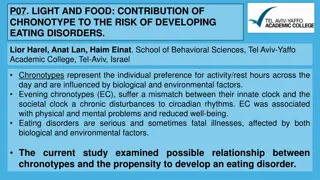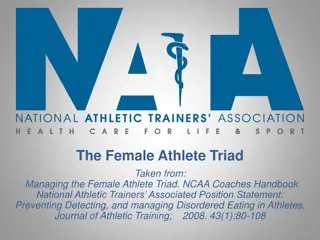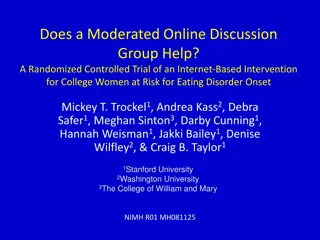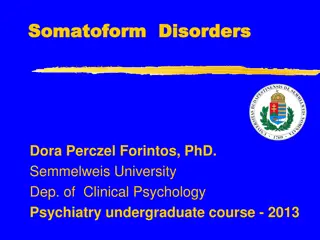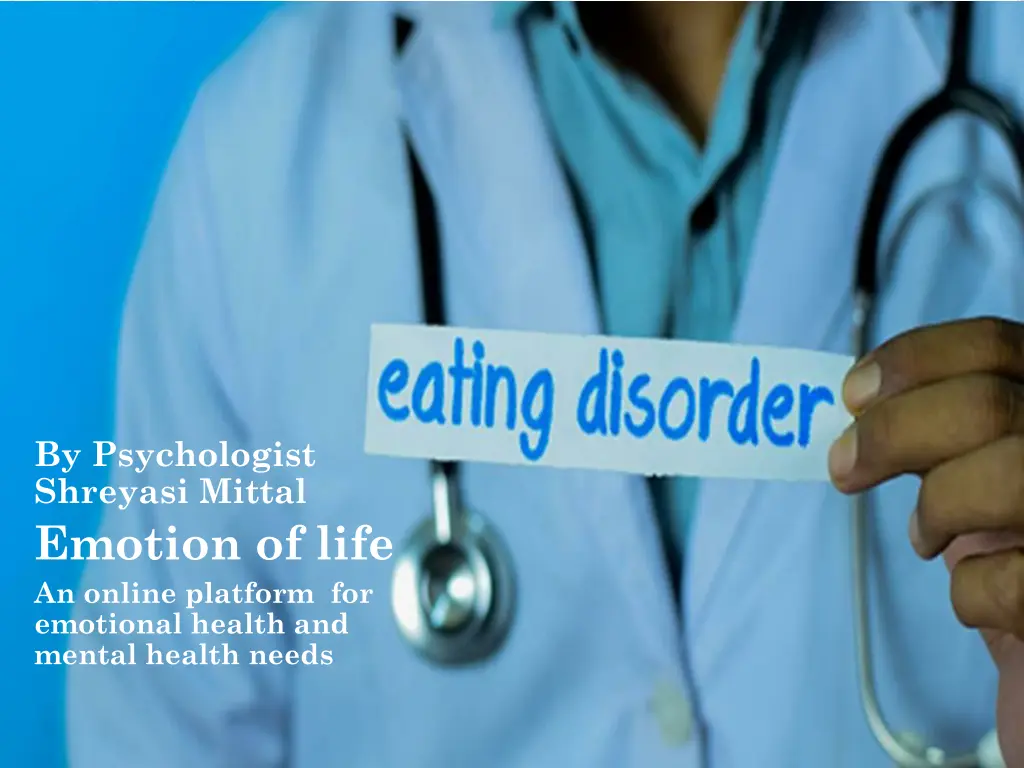
Understanding Eating Disorders: Symptoms and Causes
Explore the signs and symptoms of eating disorders such as Anorexia Nervosa, Bulimia Nervosa, and Binge Eating Disorder. Learn about the behavioral, physical, and psychological signs as well as the complex causes behind these conditions. Get insights into identifying and addressing eating disorders for emotional and mental well-being.
Download Presentation

Please find below an Image/Link to download the presentation.
The content on the website is provided AS IS for your information and personal use only. It may not be sold, licensed, or shared on other websites without obtaining consent from the author. If you encounter any issues during the download, it is possible that the publisher has removed the file from their server.
You are allowed to download the files provided on this website for personal or commercial use, subject to the condition that they are used lawfully. All files are the property of their respective owners.
The content on the website is provided AS IS for your information and personal use only. It may not be sold, licensed, or shared on other websites without obtaining consent from the author.
E N D
Presentation Transcript
By Psychologist Shreyasi Mittal Emotion of life An online platform for emotional health and mental health needs
EATING DISORDER Eating Disorders describe illnesses that are characterized by irregular eating habits and severe distress or concern about body weight or shape. Eating disturbances may include inadequate or excessive food intake which can ultimately damage an individual s well-being. The most common forms of eating disorders include Anorexia Nervosa, Bulimia Nervosa, and Binge Eating Disorder and affect both females and males. Emotion of life
WHATARETHESYMPTOMSOFEATING DISORDERS? Behavioral signs: The person appears to be fasting regularly and always seems to be counting calories. They avoid meals with others, saying they have eaten even when they haven't. Sometimes they hide the uneaten food to eat privately. They visit the bathroom frequently, usually during or immediately after meals. This could be to purge or use the toilet in an attempt to rid their body of the food they have just consumed. They check their weight multiple times a day; they also repeatedly observe themselves in the mirror. The person may become obsessed with exercise so much so that they may go out for a run even when its pouring or when they're unwell. Emotion of life
Physical signs: There is a rapid loss of weight or frequent changes in weight. The person feels tired all the time and doesn't sleep well. They feel lethargic and are unable to complete day-to-day tasks. They are extremely sensitive towards cold; they often feel cold in warm environments as well. The person may feel faint or dizzy often. Women may experience disturbances in their menstrual cycle; sometimes they may stop completely. Emotion of life
Psychological signs: It is important to remember that dieting and watching what you eat are perfectly normal behaviors. Being on a strict diet does not necessarily mean that the person is suffering from an eating disorder. When a person suffers from an eating disorder, their relationship with food or their body image becomes irrational. For instance, the diet itself becomes an obsession while the reason for the diet becomes secondary, or is lost completely. Another example would be of a person who is visibly underweight and still believes they need to lose weight. Emotion of life
WHATCAUSESEATINGDISORDERS? There is no single factor because of which a person develops an eating disorder, the reasons are usually complex. Eating disorders can result from a variety of psychological, social and behavioral influences. Some of these factors are: Psychological factors: If you suffer from anxiety, depression or stress, things might seem out of your control and you may use emotional overeating or excessive exercise as a coping mechanism because you believe these are things you can control. Social factors: Media and society often inflate the importance of one's physical attributes and appearance: thin is beautiful, for instance. Constant exposure to such pressures can lead to low self-esteem. In an attempt to overcome this feeling you may start to starve yourself or exercise excessively. Emotion of life
Behavioral factors: People who display certain personality traits may be more susceptible to developing an eating disorder. People who show obsessive behavior, or those who are perfectionists and are extremely critical of themselves , are known to be more vulnerable. Life events: People who have been bullied or teased about their weight, or have history of physical or sexual abuse, may develop an eating disorder while trying to cope with their stress. Other stressful events such as the loss of a loved one, failure at school or at work, can also be a factor. Emotion of life
WHATARETHE DIFFERENTTYPESOF EATINGDISORDERS? Anorexia Nervosa Bulimia Nervosa Binge-eating disorder Emotion of life
WHATIS ANOREXIA NERVOSA? Anorexia nervosa is an eating disorder characterized by weight loss (or lack of appropriate weight gain in growing children); difficulties maintaining an appropriate body weight for height, age, and stature; and, in many individuals, distorted body image. People with anorexia generally restrict the number of calories and the types of food they eat. Some people with the disorder also exercise compulsively, purge via vomiting and laxatives, and/or binge eat. Emotion of life
DIAGNOSTIC CRITERIA To be diagnosed with anorexia nervosa according to the DSM 5, the following criteria must be met: Restriction of energy intake relative to requirements leading to a significantly low body weight in the context of age, sex, developmental trajectory, and physical health. Intense fear of gaining weight or becoming fat, even though underweight. Disturbance in the way in which one's body weight or shape is experienced, undue influence of body weight or shape on self-evaluation, or denial of the seriousness of the current low body weight.Emotion of life
WARNING SIGNS & SYMPTOMS OF ANOREXIA NERVOSA Emotional and behavioral Dramatic weight loss Dresses in layers to stay warm Is preoccupied with weight, food, calories, fat grams, and dieting Refuses to eat certain foods, progressing to restrictions against whole categories of food (e.g., no carbohydrates, etc.) Makes frequent comments about feeling fat or overweight despite weight loss Complains of constipation, abdominal pain, cold intolerance, lethargy, and/or excess energy Denies feeling hungry Develops food rituals (e.g., eating foods in certain orders, excessive chewing, rearranging food on a plate) Cooks meals for others without eating Consistently makes excuses to avoid mealtimes or situations involving food. Emotion of life
Expresses a need to burn off calories taken in Maintains an excessive, rigid exercise regimen despite weather, fatigue, illness, or injury Withdraws from usual friends and activities and becomes more isolated, withdrawn, and secretive Seems concerned about eating in public Has limited social spontaneity Resists or is unable to maintain a body weight appropriate for their age, height, and build Has intense fear of weight gain or being fat, even though underweight Has disturbed experience of body weight or shape, undue influence of weight or shape on self-evaluation, or denial of the seriousness of low body weight Post puberty female loses menstrual period Feels ineffective Has strong need for control Shows inflexible thinking Has overly restrained initiative and emotional expression Emotion of life
Physical Stomach cramps, other non-specific gastrointestinal complaints (constipation, acid reflux, etc.) Difficulties concentrating Abnormal laboratory findings (anemia, low thyroid and hormone levels, low potassium, low blood cell counts, slow heart rate) Dizziness Fainting/syncope Feeling cold all the time Sleep problems Menstrual irregularities amenorrhea, irregular periods or only having a period while on hormonal contraceptives (this is not considered a true period) Emotion of life
Cuts and calluses across the top of finger joints (a result of inducing vomiting) Dental problems, such as enamel erosion, cavities, and tooth sensitivity Dry skin Dry and brittle nails Swelling around area of salivary glands Fine hair on body (lanugo) Thinning of hair on head, dry and brittle hair Cavities, or discoloration of teeth, from vomiting Muscle weakness Yellow skin (in context of eating large amounts of carrots) Cold, mottled hands and feet or swelling of feet Poor wound healing Impaired immune functioning Emotion of life
HEALTH CONSEQUENCES OF ANOREXIA NERVOSA In anorexia nervosa s cycle of self-starvation, the body is denied the essential nutrients it needs to function normally. Thus, the body is forced to slow down all of its processes to conserve energy, resulting in serious medical consequences. The body is generally resilient at coping with the stress of eating disordered behaviors, and laboratory tests can generally appear perfect even as someone is at high risk of death. Electrolyte imbalances can kill without warning; so can cardiac arrest. Therefore, it s incredibly important to understand the many ways that eating disorders affect the body. Emotion of life
TREATMENT Goals of treatment include restoring the person to a healthy weight, treating emotional issues such as low self-esteem, correcting distorted thinking patterns, and developing long-term behavioral changes. Treatment most often involves a combination of the following treatment methods: Psychotherapy: This is a type of individual counseling that focuses on changing the thinking (cognitive therapy) and behavior (behavioral therapy) of a person with an eating disorder. Treatment includes practical techniques for developing healthy attitudes toward food and weight, as well as approaches for changing the way the person responds to difficult situations. Medication: Certain antidepressant medications such as selective serotonin reuptake inhibitors (SSRIs) might be used to help control anxiety and depression associated with an eating disorder. Some antidepressants may also help with sleep and stimulate appetite. Other types of medications also might be offered to help control anxiety and/or distorted attitudes toward eating and body image. Emotion of life
Nutrition counseling: This strategy is designed to teach a healthy approach to food and weight, to help restore normal eating patterns, and to teach the importance of nutrition and following a balanced diet. Group and/or family therapy: Family support is very important to treatment success. It is important that family members understand the eating disorder and recognize its signs and symptoms. People with eating disorders might benefit from group therapy, where they can find support, and openly discuss their feelings and concerns with others who share common experiences and problems. Hospitalization: As mentioned above, hospitalization might be needed to treat severe weight loss that has resulted in malnutrition and other serious mental or physical health complications, such as heart disorders, serious depression, and risk of suicide. In some cases, the patient may need to be fed through a feeding tube. Emotion of life
WHATIS BULIMIA NERVOSA Bulimia nervosa, commonly called bulimia, is a serious, potentially life-threatening eating disorder. People with bulimia may secretly binge eating large amounts of food with a loss of control over the eating and then purge, trying to get rid of the extra calories in an unhealthy way. To get rid of calories and prevent weight gain, people with bulimia may use different methods. For example, you may regularly self-induce vomiting or misuse laxatives, weight-loss supplements, diuretics or enemas after bingeing. Or you may use other ways to rid yourself of calories and prevent weight gain, such as fasting, strict dieting or excessive exercise. Emotion of life
SYMPTOMSOF BULIMIA NERVOSA Usually self-diagnosable People with this condition binge eat. They then take steps to avoid weight gain. Most commonly, this means vomiting (purging). But it can also mean excessive exercising or fasting. People may experience: Behavioral: binge eating, compulsive behavior, impulsivity, self- harm, vomiting after overeating, or lack of restraint Whole body: dehydration, fatigue, food aversion, hunger, or water- electrolyte imbalance Mood: anxiety, general discontent, guilt, or mood swings Mouth: bad breath, dental cavities, or dryness Gastrointestinal: constipation, heartburn, or inflamed esophagus Weight: body weight changes or weight loss Menstrual: absence of menstruation or irregular menstruation Also common: abnormality of taste, depression, poor self-esteem, or sore throat Emotion of life
BEHAVIORAL SIGNS & SYMPTOMS Being preoccupied with your body shape and weight Living in fear of gaining weight Repeated episodes of eating abnormally large amounts of food in one sitting Feeling a loss of control during bingeing like you can't stop eating or can't control what you eat Forcing yourself to vomit or exercising too much to keep from gaining weight after bingeing Using laxatives, diuretics or enemas after eating when they're not needed Fasting, restricting calories or avoiding certain foods between binges Using dietary supplements or herbal products excessively for weight loss Emotion of life
TREATMENT Therapies: Support group: A forum for counseling and sharing experiences among people with a similar condition or goal, such as depression or weight loss. Cognitive behavioral therapy: A talk therapy focused on modifying negative thoughts, behaviors and emotional responses associated with psychological distress. Cognitive therapy: Talk therapy that focuses on replacing negative, distorted thoughts with positive, accurate ones. Dialectical behavior therapy: Talk therapy that encourages people to both accept themselves and change their negative behaviors. Counseling psychology: A branch of psychology that treats personal problems related to school, work, family and social life. Psycho education: Education about mental health that also serves to support, validate and empower patients. Family therapy: Psychological counseling that helps families resolve conflicts and communicate more effectively. Behavior therapy: A therapy focused on modifying harmful behaviors associated with psychological distress. Psychotherapy: Treatment of mental or behavioral disorders through talk therapy. Emotion of life
Medication: SSRIs: Eases symptoms of depressed mood and anxiety. Self Care: Physical exercise: Aerobic activity for 20 30 minutes 5 days a week improves cardiovascular health. If injured, pursuing an activity that avoids the injured muscle group or joint can help maintain physical function while recovering. Emotion of life
WHATIS BINGE EATING DISORDER? Individuals who suffer from Binge Eating Disorder will frequently lose control over his or her eating. Different from bulimia nervosa however, episodes of binge-eating are not followed by compensatory behaviors, such as purging, fasting, or excessive exercise. Because of this, many people suffering from BED may be obese. Frequently consuming unusually large amounts of food in one sitting and feeling that eating behavior is out of control. Emotion of life
COMMON CAUSES The causes of binge-eating disorder are unknown. But genetics, biological factors, long-term dieting and psychological issues increase your risk. Emotion of life
SYMPTOMS OF BINGE EATING DISORDER Most people with binge-eating disorder are overweight or obese, but you may be at a normal weight. Behavioral and emotional signs and symptoms of binge-eating disorder include: Eating unusually large amounts of food in a specific amount of time, such as over a two-hour period Feeling that your eating behavior is out of control Eating even when you're full or not hungry Eating rapidly during binge episodes Eating until you're uncomfortably full Frequently eating alone or in secret Feeling depressed, disgusted, ashamed, guilty or upset about your eating Frequently dieting, possibly without weight loss Emotion of life
RISKFACTORS Binge-eating disorder is more common in women than in men. Although people of any age can have binge-eating disorder, it often begins in the late teens or early 20s. Factors that can increase your risk of developing binge-eating disorder include: Family history. You're much more likely to have an eating disorder if your parents or siblings have (or had) an eating disorder. This may indicate that inherited genes increase the risk of developing an eating disorder. Dieting. Many people with binge-eating disorder have a history of dieting. Dieting or restricting calories during the day may trigger an urge to binge eat, especially if you have symptoms of depression. Psychological issues. Many people who have binge-eating disorder feel negatively about themselves and their skills and accomplishments. Triggers for bingeing can include stress, poor body self-image and the availability of preferred binge foods. Emotion of life
TREATMENT The goals for treatment of binge-eating disorder are to reduce eating binges and achieve healthy eating habits. Because binge eating can be so entwined with shame, poor self-image and other negative emotions, treatment may also address these and any other mental health issues, such as depression. By getting help for binge eating, you can learn how to feel more in control of your eating. Psychotherapy: Whether in individual or group sessions, psychotherapy (also called talk therapy) can help teach you how to exchange unhealthy habits for healthy ones and reduce bingeing episodes. Examples of psychotherapy include: Cognitive behavioral therapy (CBT). CBT may help you cope better with issues that can trigger binge-eating episodes, such as negative feelings about your body or a depressed mood. It may also give you a better sense of control over your behavior and help you regulate eating patterns. Interpersonal psychotherapy. This type of therapy focuses on your relationships with other people. The goal is to improve your interpersonal skills how you relate to others, including family, friends and co-workers. This may help reduce binge eating that's triggered by problematic relationships and unhealthy communication skills. Dialectical behavior therapy. This form of therapy can help you learn behavioral skills to help you tolerate stress, regulate your emotions and improve your relationships with others, all of which can reduce the desire to binge eat. Emotion of life
Medications: Lisdexamfetamine dimesylate (Vyvanse), a drug for attention-deficit hyperactivity disorder, is the first FDA- approved medication to treat moderate to severe binge-eating disorder in adults. A stimulant, Vyvanse can be habit-forming and abused. Common side effects include a dry mouth and insomnia, but more-serious side effects can occur. Several other types of medication may help reduce symptoms. Examples include: Topiramate (Topamax), an anticonvulsant. Normally used to control seizures, topiramate has also been found to reduce binge- eating episodes. However, there are side effects, such as dizziness, nervousness, sleepiness and trouble concentrating, so discuss the risks and benefits with your medical care provider. Antidepressants. Antidepressants may reduce binge-eating. It's not clear how these can reduce binge eating, but it may relate to how they affect certain brain chemicals associated with mood. Emotion of life
FORFURTHERINQUIRYWRITETOUS AT INFO@EMOTIONOFLIFE.IN ORCALLUSAT 7678694626 YOUCANALSO VISITUSON HTTPS://EMOTIONOFLIFE.IN/ Emotion of life



